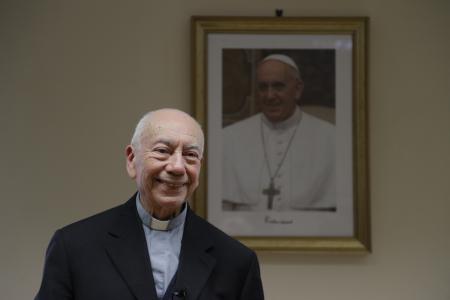It was easily predictable that the Amoris Laetitia (particularly footnote 351), would lead to jarring assaults on the Church’s doctrinal unity – even by some of the Church’s own shepherds. Cardinal Francesco Coccopalmerio, President of the Pontifical Council for Legislative Texts, has just joined the ranks of prelates who say that Pope Francis has authorized giving Holy Communion to those in adulterous second “marriages.” Coccopalmerio even extends this permission to others living in sexual relationships apart from marriage in his newly published booklet, The Eighth Chapter of the Post-Synodal Apostolic Exhortation Amoris Laetitia (which some think authoritative since it was issued by the Vatican’s own publishing house, the Libreria Editrice Vaticana).
The divorced and remarried, de facto couples, those cohabiting, are certainly not models of unions in sync with Catholic Doctrine, but the Church cannot look the other way. Therefore, the sacraments of Reconciliation and of Communion must be given even to those so-called wounded families and to however many who, despite living in situations not in line with traditional matrimonial canons, express the sincere desire to approach the sacraments after an appropriate period of discernment. . . .it is a gesture of openness and profound mercy on the part of Mother Church, who does not leave behind any of her children, aware that absolute perfection is a precious gift, but one which cannot be reached by everyone.
What do we find here? Slogans and euphemisms. A slogan is meant to stop discussion. Euphemisms intentionally steer the reader away from precise and accurate descriptions of reality. A seminary professor of mine once noted that verbal engineering always precedes social engineering. In this case, it’s doctrinal engineering
Slogans such as “look the other way” and “not leave behind any of her children,” and euphemisms such as “so-called wounded families” and “situations not in line with traditional matrimonial canons” show a decision not to present a carefully reasoned and precise defense of what is being endorsed. Rather, Coccopalmerio tries to sweep the reader along with emotional appeals and misdirection.
“Not looking the other way,” means that the Church should simply ignore the sinfulness of certain behaviors. In the case of unions involving adultery and fornication, the question is not about healing “so-called wounded families” but warning sinners that their behavior gravely offends God.
When he says that the Church should “not leave behind any of her children,” he means that the refusal to give Communion to those publicly living a seriously sinful life would be an unjust abandonment. Adulterous unions are now simply “situations not in line with traditional matrimonial canons.” God’s law on the indissolubility of marriage and the immorality of adultery is now a mere “tradition” embodied in a canon. Violating that law is only a “situation not in line” with that canon, which was written down somewhere, at some time, by someone. How important is a canon compared to actual people who “express the sincere desire to approach the sacraments after an appropriate period of discernment”?

Coccopalmerio describes observing the Sixth Commandment as “absolute perfection [that] is a precious gift, but one which cannot be reached by everyone.” But the Church has never taught that observing the Sixth Commandment is a state of “absolute perfection,” beyond the capability of any of her sons and daughters. It’s an error to consider marital fidelity as an ideal not reachable by many Christians. The grace of the sacrament of marriage is given by God to strengthen married persons in fulfilling their obligation to marital fidelity. Infidelity is a choice against one’s obligations to God and one’s spouse. It is not an authorized alternative for those who “cannot” reach “absolute perfection.”
Coccopalmerio further states: ““The Church could admit to the Penitence and Eucharist the faithful who find themselves in illegitimate unions [who] want to change that situation, but can’t act on their desire.”
God does not permit, let alone oblige, anyone to commit a mortal sin. And He does not authorize anyone to publicly enter a union that contradicts His law on marriage. A person who has placed himself is an adulterous union must for the good of his soul get himself out of that situation. The Church has the duty to uphold the sanctity of the Holy Eucharist. Those who publicly reject the Sixth Commandment, in various ways, cannot be admitted to the reception of Holy Communion until they have put an end to their sinful acts.
In contrast to all this, Cardinal Robert Sarah has published a second book-length interview with French journalist Nicholas Diat, which will soon appear in English: The Power of Silence, Against the Dictatorship of Noise. In this profound dialogue about the need for believers to recover a love for silence in our agitated world, Cardinal Sarah addresses the burning questions raised by chapter eight of Amoris Laetitia:
Christ is certainly afflicted in seeing and hearing priests and bishops who should protect the integrity of the teaching of the Gospel and of doctrine multiplying words and writings that dilute the rigor of the Gospel by their deliberately ambiguous and confused affirmations. To these priests and these prelates who give the impression of taking up the exact opposite of the traditional teaching of the Church in matters of doctrine and morality, it is not out of place to recall the severe words of Christ: “Therefore I tell you, every sin and blasphemy will be forgiven men, but the blasphemy against the Spirit will not be forgiven. And whoever says a word against the Son of man will be forgiven; but whoever speaks against the Holy Spirit will not be forgiven, either in this age or in the age to come.” “He is guilty of an eternal sin”, Mark adds. (My translation)
The rigor of the Gospel is what will save souls. The dilution of that rigor by anyone in the name of false compassion does great harm by reworking the Gospel into something it is not.















